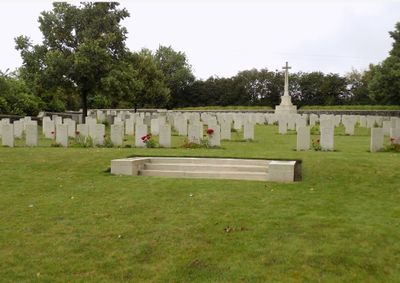Gordon Weston Johanson
From Our Contribution
 | |
| Personal Information | |
|---|---|
| Date of Birth | not known 1895 |
| Place of Birth | Broken Hill, New South Wales |
| Death | 2 Oct 1918 |
| Age at Enlistment | 21 years, 2 months |
| Description | 5'6" (1.68m) tall; weight 120 lbs (54.4kg); dark complexion, grey eyes, brown hair. |
| Occupation | mill hand |
| Religion | Methodist |
| Address | NOK No2 Railway Mill, Dwellingup, Western Australia |
| Next of Kin | Father Mr Carl Sander Johanson |
| Military Information | |
| Reg Number | 5382 |
| Date of Enlistment | 2 Mar 1916 |
| Rank | Private |
| Unit/Formation | 28th Battalion, 14th Reinforcement / 7th Brigade, 2nd Division |
| Date of Embarkation | 7 Aug 1916 - 24 Sep 1916 |
| Ship Embarked On | HMAT A28 Miltiades |
| Fate | Killed in Action 2 Oct 1918 Montbrehain |
| Monument |
Jarrahdale Honour Roll ANZAC Memorial Park (Byford) Australian War Memorial |
| Medals |
British War Medal Victory Medal |
Pre War
War Service
On arrival in England he was sent to the 7th Training Battalion at Rollestone. While there, on 29 Oct 1916 he was charged with overstaying leave from Midnight 23 Oct until hr reported to the Guard Room on 26 Oct 1916. A He was awarded 168 hours detention, and forfeited 19 days pay.
On 16 Nov 1916 Gordon proceeded overseas to France from Folkestone aboard HMT Victoria. Before he joined his unit he contracted mumps and was hospitalised in the 24th (Étaples) and 16th (Camiers) General Hospitals from 3 to 23 Dec 1916.
Gordon joined the 28th Battalion on 9 Jan 1917, but on 12 Feb 1917 he presented with bronchitis to the 8th Field Ambulance. Sent on to the 1st Australian Casualty Clearing Station who treated him on 17 & 18 Feb 1917, and when he showed no improvement, he was placed on the Ambulance Train for the 1st General Hospital at Etretat on the coast north of Le Havre where he was admitted on 19 Feb 1917. By 1 Mar 1917 he was being treated for pleurisy, and was not released back to duty until 21 Apr 1917. From September to November he was attached to the Brigade Sniper unit, rejoining the 28th Battalion on 25 Nov 1917.
From 20 Jan 1918 until 6 Feb 1918 he enjoyed leave in England. Back in France, on 15 May 1918 he was admitted to hospital with influenza, being treated in turn by the 5th Australian Field Ambulance, the 61st Casualty Clearing Station, and on 19 May 1918 he was admitted to the 1st Canadian General Hospital in Étaples. Transferred to the 73rd General Hospital at Trouville on 23rd before being released to the 4th Australian Convalescent Depot in Le Havre on 31 May 1918. Released to the base depot on 13 Jul 1918, he rejoined the 28th Battalion on 21 Jul 1918.
On 1 Oct 1918 the 28th Battalion was resting near Templeux-la-Fosse. It was ordered into the line and marched north east through Bellicourt to reach the trenches about 3:00am on the morning of 2 Oct 1918. Enroute shell fire had claimed the life of 1 other rank, and wounded 2 others. During the 2nd there were no further casualties as the battalion readied itself for an attack on enemy positions fronting the Beaurevoir Line on 3 Oct 1918.
A Battalion history, The Blue & White Diamond covers this event. At 10pm the 28th Battalion moved in a northeasterly direction along Sentinel Ridge, through Villeret and Bellicourt to trenches in the Le Catelet-Nauroy Line. Due to the darkness of the night, rain and the very heavy road traffic, the march was very strenuous. Sporadic shellfire fell on the road and a salvo of shells bracketed the marching troops, resulting in the death of Private G.W. Johanson and the wounding of two other ranks.[1]
Gordon's Red Cross file held at the Australian War Memorial provides further detail [2]
"I saw Johanson's (C Coy) body immediately after he was killed instantly (badly mutilated) by shell between Estrees and Bellecourt (Bugnicourt) in support line about 9:00 a.m. W Woods was mortally wounded by same shell (we carried him to the RAP and he died shortly after leaving it). Johanson's body was taken to Bellecourt (Bugnicourt). They were in a bit of a bivouac at the time having breakfast - we gave in his pay book, I don't know about burial." 4557 Pte Edgar Taylor Stretcher-bearer C Coy 28th Battalion.
"We were occupying a trench about 899 yards in front of Bellicourt in the evening of 2 Oct 1918. Johanson was in a dug-out with a chap named Wood. A shell landed on the dug-out breaking Johanson's back and killing him instantly. Wood was severely wounded in the head and died soon after. The stretcher-bearer who attended to these men was named Ernie Pearce, 14th Reinforcements / 28th Battalion. I knew Johanson well. Hew was in C Coy with me, was a small thin chap, fair complexion and came from Dwellingup W.A." 3197 Pte S. Diss.
Notes
Buried at Hargicourt British Cemetery, Sailly Laurett, 15 kms north west of St Quentin. Plot VI, Row J, Grave No 4. His death was report in Casualty List 446[3]
Although the name on the monument is J. Johansen, this soldier is more likely to be the person referred to
Gordon's father Carl Sander Johanson died 10 Mar 1919 in the Pinjarra Hospital from severe burns.
References
- ↑ The Blue & White Diamond - 28th Battalion. Neville Browning. Advance Press page 456
- ↑ "Australian Red Cross Wounded and Missing Files - Gordon Weston Johanson". Australian War Memorial. 2018. Retrieved 2 May 2018.
- ↑ "LIST NO. 446". Western Argus. 23, (5065). Western Australia. 3 December 1918. p. 11. Retrieved 19 October 2017 – via National Library of Australia.
External Links

